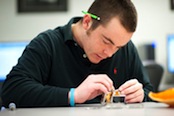Pilot project leaves students to their own devices
News
A California firm dedicated to extending the lifespan of electronic devices and keeping them out of landfills enlisted a group of about 40 Writing, Rhetoric and Technical Communication students at James Madison University to contribute to its free online repair manual, iFixit.com. JMU was one of eight schools in the U.S. chosen to participate in the pilot project during the fall semester.
After researching the technical writing program at JMU, iFixit contacted WRTC instructor Cindy Allen last summer to gauge her interest in the project. "Cindy's reaction was definitely the most enthusiastic that I've seen," said iFixit's Miro Djuric. "We set up a phone conference shortly after my email, and the rest is history." For her part, Allen admits she's always willing to "guinea pig" her students for such projects because they gain valuable skills and experience with real-life applications. Her Professional and Technical Writing class in spring 2011 participated in an initiative to improve the content of the popular online resource Wikipedia.
Allen's fall classes took on the challenge of adding new product entries for iFixit's wiki-style manual, complete with detailed pictures and a step-by-step repair guide. "Most people think writing instructions is easy, but there are some techniques that you need to apply to make them functional and easy to follow," she said.
At iFixit's recommendation, Allen divided her classes into six teams, and students were allowed to choose their own roles such as writer, editor, photographer or technician. "In watching students work, I think it makes good sense to do this project in groups," Allen said.
iFixit supplied the devices — mostly cellphones, cameras and printers. "Some stuff worked, some stuff didn't," Allen said. But all of the devices had yet to be documented on the iFixit website. The company also sent tool kits to assist with taking apart the devices as well as special lighting to be used during photography. JMU's Carrier Library provided camera and tripod equipment.
The teams initially had to research their assigned device to determine if there were any online repair manuals already out there and, if so, how they might be improved. The first milestone involved developing a list of troubleshooting tips based on everything that could break down on the device. From there, the students created a repair guide. Along the way, they communicated via email with iFixit's technical writers, who were quick to respond with help and suggestions.
The process wasn't always easy. Some teams lacked certain technical expertise while others had to compensate for a member's absence. Still others were unhappy with their device. But Allen points out that such obstacles surface during real-world projects, and she impressed upon the teams the importance of working together to overcome them.
Allen required that her students write a reflective paper at the end of the project detailing "the good, the bad and the ugly, and how it might be improved on in future semesters." They also were asked to evaluate their team members.
Vickie Burns, a junior WRTC major from Warrenton, found the experience of working on a wiki repair manual rewarding. The 58-year-old former programming analyst with IBM said she was excited to be able to update her skills. "Being a nontraditional student, I had not done things like blogging or wikis. So it was an exposure to something that I needed to know because everyone else seems to know it." The project also appealed to one of Burns' personal goals. "I want to be published and have my name out there," she said.
For others, the project served as a reminder of the importance of reducing e-waste.
Denise Cooper, a staff member in JMU's orientation office who is taking classes through the university's Adult Degree program, said she is considering selling her old Samsung cellphone that her team adopted for the project on eBay rather than throwing it away. "It still works, so let someone else get the use out of it," she said.
James Vogric, a senior WRTC major from Long Island, N.Y., said the class changed his perspective on recycling. "I'm glad there are companies out there like this because people will just put this stuff in the trash. Next time I have a dead device, I'm not going to just throw it away. I can give it to someone who can use it or recycle it."
Djuric said JMU students' scores on their repair guides were second only to California Polytechnic State University, where iFixit was born and whose professors have been working on the wiki project for over two years. "We've been quite pleased with both JMU and Cindy, and we hope she works with us for a long, long time."
Related links:
# # #

